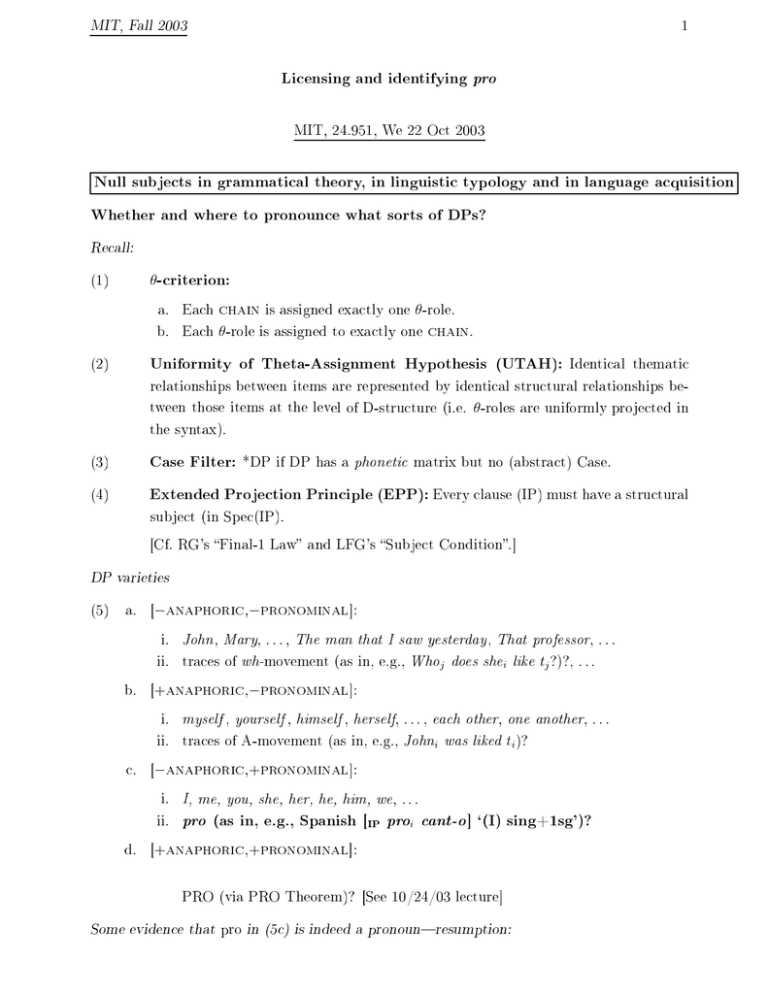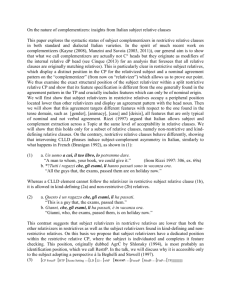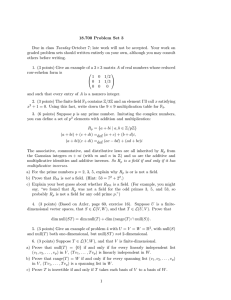Licensing and identifying
advertisement

MIT, Fall 2003 1 Licensing and identifying pro MIT, 24.951, We 22 Oct 2003 Null subjects in grammatical theory, in linguistic typology and in language acquisition Whether and where to pronounce what sorts of DPs? Recall: (1) -criterion: a. Each chain is assigned exactly one -role. b. Each -role is assigned to exactly one chain. (2) (3) (4) Uniformity of Theta-Assignment Hypothesis (UTAH): Identical thematic relationships between items are represented by identical structural relationships between those items at the level of D-structure (i.e. -roles are uniformly projected in the syntax). Case Filter: *DP if DP has a phonetic matrix but no (abstract) Case. Extended Projection Principle (EPP): Every clause (IP) must have a structural subject (in Spec(IP). [Cf. RG's Final-1 Law and LFG's Subject Condition.] DP varieties (5) a. [?anaphoric,?pronominal]: i. John , Mary, . . . , The man that I saw yesterday , That professor, . . . ii. traces of wh-movement (as in, e.g., Who does she like t ?)?, . . . b. [+anaphoric,?pronominal]: i. myself , yourself , himself , herself, . . . , each other, one another, . . . ii. traces of A-movement (as in, e.g., John was liked t )? c. [?anaphoric,+pronominal]: i. I, me, you, she, her, he, him, we, . . . ii. pro (as in, e.g., Spanish [IP pro cant-o ] `(I) sing+1sg')? d. [+anaphoric,+pronominal]: j i i i PRO (via PRO Theorem)? [See 10/24/03 lecture] Some evidence that pro in (5c) is indeed a pronounresumption: j i 2 24.951 (6) a. That asshole X, *[who I loathe and despise the ground t walks on ], pointed out that . . . b. That asshole X, *[CP who [TP I loathe and despise [DP the ground [CP O [TP t walks on t ]]]]], pointed out that . . . c. That asshole X, p[who I loathe and despise the ground he walks on ], pointed out that . . . (See Prince 1990, http://babel.ling.upenn.edu/ ellen/respro.ps) i i i j i (7) i j i That asshole X, p [who I loathe and despise t /*him ], pointed out that . . . i i i (8) a. That's the guy [CP who [IP Mary knows [DP the woman [CP who [IP *(he ) married t b. Ese es el tipo [CP que [IP Maria conoce [DP a la mujer [CP [con quién] [IP pro se casó t i j i i j Null subject as a parameter? (9) a. John /*; saw that lm b. Juan /; vió ese lm j i (English) (Spanish) (10) a. He said that *(it ) seems to him that John killed the dog parece que Juan mató al perro b. Él /; dijo que ; le He said that to-him/her seems that Juan killed the dog `He said that it seems to him/her that Juan killed the dog' What's a parameter? (English) (Spanish) (11) a. An isolatable property that correlates with a cluster of grammatical phenomena. b. A switch whose value is xed in the course of language acquisition UG qua S0 (initial state of language faculty) [universal principles alongside parameters with un-assigned, perhaps default, settings] + PLD (source of triggers or cues for the xing of parametric values) = Idiolect-Specic Grammar qua S (steady state of language faculty) s [universal principles alongside parameters with values xed] j MIT, Fall 2003 3 A Null Subject Parameter à la (e.g.) Jaeggli & Sar 1989? (12) a. What grammatical properties are related with the licensing of pro ? i. Free subject inversion? ii. Violations of that -trace lter? [Cf. Bani-Hassan Arabic (pro, subject inversion, subject extraction over a lled complementizer) vs. Levantine Arabic (no pro, no subject inversion, no subject extraction over a lled complementizer); Kenstowicz 1989] b. How does UG connect the properties in (12a)? Licensing and Identication of pro Is rich verbal agreement a necessary and/or sucient condition? (13) Spanish: habl-o habl-as habl-a habl-amos habl-áis habl-an (14) English: (15) French: (16) `I speak' `you speak' `he/she speak' `we speak' `you (pl.) speak' `they speak' 1sg 2sg 3sg 1pl 2pl 3pl to talk innitive talk present 1s, 2s, 1pl, 2pl, 3pl talk-s present 3s [parl-e] innitive (`to talk') [parl] present 1s, 2s, 3s, 3pl [parl-õ] present 1pl [parl-e] present 2pl But, what about licensing of pro in Chinese? The latter has no verbal inection whatsoever. Jaeggli & Sar's (1989) proposal: (17) The Null Subject Parameter: Null subject are licensed in all and only lan- (18) Morphological Uniformity: An inectional paradigm (19) Identification by Agreement: AGR can identify an empty category as thematic guages with morphologically uniform inectional paradigms. in a language L is morphologically uniform i P has either only underived forms or only derived forms. P 4 24.951 pro i the category containing AGR Case-governs the empty category [and AGR is rich enough]. German (20) (ich ) arbeit-e (du ) arbeit-est (er /sie ) arbeit-et (wir ) arbeit-en (ihr ) arbeit-et (sie /sie ) arbeit-en `I work' `you work' `he/she work' `we work' `you (pl.) work' `they work' 1s 2s 3s 1p 2p 3p (21) a. * Er sagte, dass ; den Hund getötet hat He-NOM said that the-ACC dog killed has `He said that he/she has killed the dog' b. Er sagte, dass ; ihm scheint, dass Hans den Hund getötet hat He-NOM said that him-DAT seemed that Hans the-ACC dog killed has `He said that (it) seemed to him that Hans killed the dog' (22) a. German null subjects function as expletives onlyno thematic null subjects b. German (as a V/2 language ) has the subject's Case-governor (Tense) in COMP and AGR in INFL. West Flemish: (23) a. dase pro komt `that she comes' b. *da pro komt `that he/she comes' (24) dase is the agreeing complementizer; thus, in (23a) the Case-governor (here Tense) and AGR are in the same node. European Portuguese: (25) a. * (Eu ) vi [pro a roubarem automóveis ] `I saw them stealing cars' b. E dicil [pro trabalharem tanto ] `It is dicult for them to work that hard' (Prepositional Inected Innitive) (Bare Inected Innitive) (26) a. The Prepositional Inected Innitive construction (as in (25a)) instantiates ECM, with ACC case on the lexical subject of the inected innitive (i.e., ACC Casegovernor and innitival Agr are in separate nodes). b. In the Bare Inected Innitive construction (as in (25b)) instantiates ECM, innitival Agr does govern NOM Case on the lexical subject (i.e., NOM Case-governor and MIT, Fall 2003 5 innitival Agr are in the same node). (27) Non-local identification of Agreement: A subordinate null subject is con- (28) Zhangsan shuo [ pro AGR lai le ] Zhangsan say come ASP `Zhangsan said that he came' trolled by a higher subjectwhenever there is no local government by tense/agreement with morphological content, then a c-commanding NP must provide an antecedent . . . [the subordinate] Agr inherits features from a c-commanding NP, usually a higher subject, and then these features identify the null subject of [the subordinate] complement clause (Jaeggli & Sar 1989:36, à la Borer 1989; but see Landau, to appear [and 10/24/03 lecture]). i i (Chinese) i Problems (29) a. One parameter setting; two typological classesinecting (e.g., Spanish) vs. isolating (e.g., Chinese)? b. Where do parameters live? In the morphology ? (30) What grammatical properties cluster around the null subject parameter? pro-licensing with(out) free-subject inversion (31) a. Gianni ha telefonato `Gianni has telephoned' b. Ha telefonato Gianni `Gianni has telephoned' (Italian) (32) a. Zhangsan kanjian le Lisi `Zhangsan saw Lisi' b. * Kanjian le Lisi Zhangsan (Chinese) That-trace lter violations with(out) pro-licensing (33) (34) (Italian) Chi credi che pro verrà t ? who believe COMP will-come `Who do you believe that will come?' i i [ Welche Leute ] meinst du, dass Peter glaubt, dass t recht hätten which people think you that Peter believes that right have `Which people do you think that Peter believes (*that) are right?' (German; Law 1991) Morphological uniformity with(out) (thematic) pro-licensing i i (35) a. Haitian Creole, like Chinese, shows no agreement- or TMA-related verbal inection. b. Haitian Creole, unlike Chinese, licenses only expletive pro no licensing of thematic pro (Déprez 1992; but see DeGra 1991, 1996). 6 24.951 (36) a. b. c. d. e. (37) Boukinèt di toutmoun ( ke ) ; genlè Jak renmen li Boukinèt say everyone that seem Jak love 3sg Boukinèt has told everyone that it seems that Jack loves her Mwen kwè ( ke ) ; te fè frèt Kensco 1sg believe that ANT make cold I believe that it was cold in Kensco Timoun yo kwè ( ke ) ; gen jwèt sou tab la child the-PL believe that have toys on table the The children believe that there are toys on the table Mwen kwè ( ke ) 1sg believe that ; te manke Bazin yon voum vòt pou li monte prezidan ANT lack Bazin a lot vote for 3sg rise president I believe that Bazin lacked the many votes that he needed to become president Mwen kwè ( ke ) 1sg believe that ; ap rete liv sou tab la FUT remain book on table the I believe that here will remain books on the table *(mwen) achte twa liv 1sg buy three book I bought three books What kind of `pronoun' is pro ? (Iatridou & Embick 1997 (38) If [we arrive late ] it will convince Mary to buy us a car i i (39) a. * Si [ pro arribem tard ] pro convencerá la Maria de compra-nos un cotxe If pro arrive-1PL late pro convince-FUT the Mary to buy-us a car `If we arrive late, it will convince Mary to buy us a car' (Catalan) b. If [arribem tard ] aixo convencerà la Maria de comprar-nos un cotxe i i (40) i i Se [ loro non tornassero ] , questo preoccuperebbe tutti If they not return this would worry everyone perchè pro farebbe loro pensare che pro hanno dimenticato il plano because pro would-make them think that pro have forgotten the plan `If they didn't return, this would worry everyone, because it would make them think that they had forgotten the plan' (Italian) k i i i j j k MIT, Fall 2003 (41) 7 State Of Affairs " NP " a. pro b. " * CP " pro c. Iatridou & Embick's analysis " " * " pro (42) a. CP/IP lack -features: i. CP/IP lack the feature Gender [36] ii. CP/IP lack the feature Number [37,41] iii. CP/IP (probably) lack the feature Person b. Referential pro in null-subject languages that license pro via morphological richness (e.g., Spanish, Italian, Catalan, etc.)must be associated with -features. Pro is the real pro-noun .

